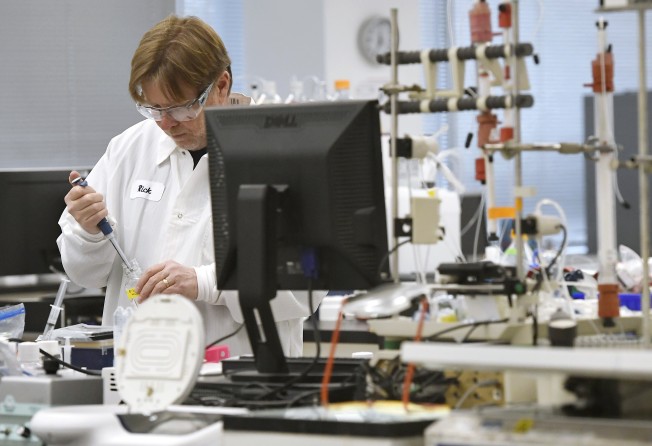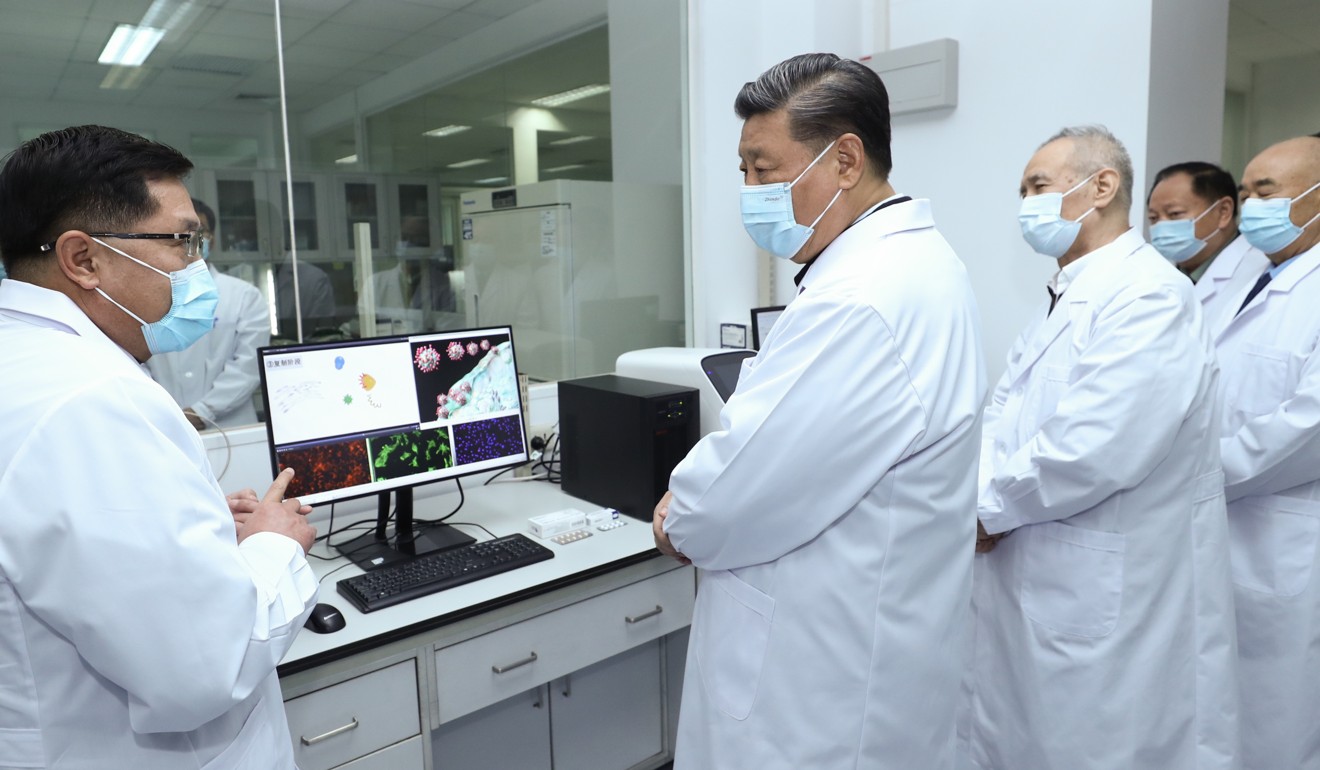Coronavirus: with a pandemic confirmed, the race is now on to develop a vaccine
- Boss of Chinese research company says it could have a product on the market this year if testing goes well
- Phase one trials of a nucleic acid vaccine set to get under way in Seattle this week, US expert says

With the Covid-19 pandemic now sweeping the world and the death count rising, a new urgency has emerged to develop a vaccine against the virus and the pneumonia-like disease it causes.
More than 134,000 people were infected in more than 100 countries as of Thursday. The pathogen has killed more than 5,000 people.
Researchers around the globe are trying different approaches to make a vaccine for the virus known as Sars-CoV-2. They include the conventional use of dead or weakened pathogens and others that are genetically modelled. It is unclear how long the development will take. The previous Sars epidemic happened 17 years ago, but no vaccine has been developed.
“That’s the big question,” said Neil King, a vaccine researcher and assistant professor at the Institute for Protein Design at the University of Washington.
“I think nucleic acid vaccines, like mRNA, will be fastest – there’s a phase one trial from Moderna starting this week in Seattle.”
King was referring to the mRNA vaccine candidate by biotechnology company Moderna, which is based in Massachusetts in the US. Working with the US-funded National Institutes of Health, the vaccine is the closest to human testing, with a trial planned for 45 people in Seattle this month.
Five of the 35 Covid-19 candidate vaccines – including those from Imperial College London, Arcturus and CureVac – listed by the World Health Organisation earlier this month as using RNA technology are now at the preclinical stage. China, with nine vaccines under study, has two nucleic acid-based versions.
Technical advances have dramatically reduced laboratory research time and made it much faster to leap to the important stage of clinical trials – the first test of a possible Sars vaccine was conducted more than a year after the outbreak 17 years ago. It took only about four months for Covid-19.
Conventional, or inactivated, vaccines are produced by injecting an inactivated virus into a living cell, such as a chicken embryo as the culture.
The virus is then purified and added to an adjuvant – a compound that enhances the effectiveness of the body’s immune response – and injected into the body, priming the immune system to respond to the virus without the person getting sick.
The DNA or RNA-based vaccine technology, however, saves a lot of laboratory time by using a copy of the genetic code of the virus instead of the actual virus. This work was made possible after Chinese scientists released the genome sequencing of the new coronavirus on January 11.
Messenger ribonucleic acid, or mRNA, tells cells how to make proteins, which govern almost all functions in the human body.
Scientists have identified the structure of proteins, called “spikes”, on the surface of the new coronavirus, which bind to human cells and allow it to invade human cells, causing the sometimes fatal infection known as Covid-19.
A mRNA vaccine, in theory, orders the body’s cells to trigger an immune response to attack any future invaders carrying these protein spikes.
Other approaches are also under research, such as a viral vector being developed by Tianjin-based Cansino Biologics in cooperation with China’s Academy of Military Medical Sciences. The pair jointly developed an adenovirus-based vector vaccine against Ebola in 2017.
Chengdu-based Clover Biopharmaceuticals is teaming up with vaccine maker GSK, which will provide adjuvants, to work on a protein subunit vaccine against Covid-19.
US virologists have estimated it will take a year to 18 months to develop a commercial vaccine if clinical trials go well, but Chinese experts are expecting results sooner.
The Chinese Centre for Disease Control and Prevention, Tongji University and Stermina in Shanghai, which are jointly developing an mRNA vaccine candidate, said they had completed animal tests and if they proved successful, the vaccine could advance to clinical trials on humans as early as April.
Stermina’s chief executive Li Hangwen told Thepaper.cn this week that the vaccine could arrive on the market this year if first-phase clinical trials went smoothly.
“We are engaging researchers of other pipelines to speed up the research and development progress of the vaccine,” he said.
Shanghai vaccine expert Tao Lina said commercial availability could be moved forward as early as this autumn if the trial was designed and prepared well.
“I am making the assumption in a really, really smooth scenario, that is, all the volunteers are prepared in advance to start clinical trials immediately when samples are ready,” Tao said.
Chinese authorities are fast-tracking vaccine development for Covid-19, involving regulatory authority at the initial stage and having animal test institutions prioritise the trials.
If animal tests prove vaccine candidates safe and effective, clinical trials in China have three phases before production.
The first involves dozens of volunteers and lasts for two weeks to observe the safety of the vaccine. The second uses hundreds of volunteers. Safety and effectiveness are carefully monitored and experiments are made to find a prime vaccination scenario.
The third phase involves more than a thousand volunteers to gain a clearer picture of how safe the vaccine is and establish its efficacy, or the percentage reduction of disease in a vaccinated group of people compared to an unvaccinated group, using the most favourable conditions.

“The first phase is really short. For the second phase you can wait for two weeks to see whether an antibody has been developed, or draw blood every few days to check regularly. In an ideal scenario the trial can be conducted within several months,” Tao said.
But there are technical difficulties researchers cannot overlook, such as a problem known as “vaccine enhancement”, which can make the disease worse for a vaccinated person when infected with the actual virus.
The most recent case was Sanofi Pasteur’s Dengvaxia, which was developed to fight dengue fever but found to cause more serious cases if given to those who had not had a prior infection.
“Such problems can occur and be fixed, say by adding an adjuvant, but it will prolong the trial process,” Tao said.
Another factor that could impair the trial was finding the right environment to test whether the vaccine was effective, as the epidemic in China was now coming under control, Tao said.
On Thursday, the country reported just a dozen or so new cases.
“Even if the trial is conducted among health care workers, it will be hard to tell because they will be well protected by their gear,” Tao said.
Other practical matters include building a new production line for the vaccine that passes the drug regulator’s standards for mass production. Authorities have indicated they are ready to move quickly on the assessment to accelerate that process.
Purchase the China AI Report 2020 brought to you by SCMP Research and enjoy a 20% discount (original price US$400). This 60-page all new intelligence report gives you first-hand insights and analysis into the latest industry developments and intelligence about China AI. Get exclusive access to our webinars for continuous learning, and interact with China AI executives in live Q&A. Offer valid until 31 March 2020.